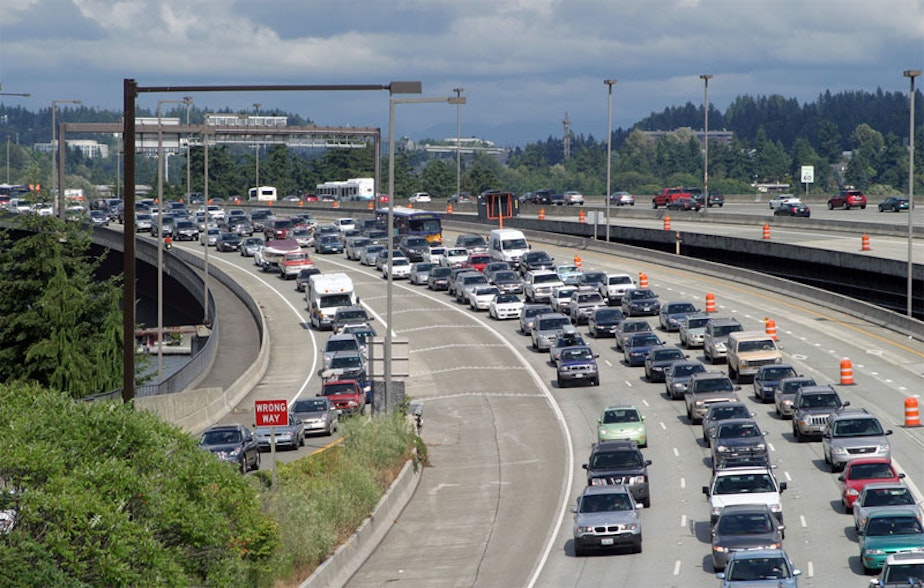Road ahead may charge by the mile, but change rolls slowly in Northwest

The panel that sets highway and bridge tolls in Washington is recommending the state follow Oregon's lead and phase in a pay-by-the-mile road tax to make up for expected declines in gas tax revenue. The nonbinding recommendation to the Washington Legislature from the state Transportation Commission drew flak from skeptical taxpayers and faces a bumpy road ahead in the 2020 election year.
The seven appointed transportation commissioners urged a slow and gradual transition away from the state gas tax. The panel on Tuesday endorsed a mileage tax, which they framed as a “road usage charge,” as a promising and viable replacement for the gas tax. The recommendation package did not specify a particular tax rate.
"This is an important first step in ensuring future funding security for Washington’s aging roads and bridges," said Jerry Litt, the chair of the state Transportation Commission. "Revenues from our state gas tax will begin to decline as vehicle fuel efficiency continues to increase. We are already struggling to ensure adequate funding to maintain our system of roads and bridges today."
Before Tuesday's vote, the panel heard from a series of dubious, unhappy taxpayers, who urged the commissioners to reconsider their recommendations.
"This charge is going to add more and more money that I don’t have," said Rita Caywood, a retired Air Force veteran from Federal Way, Washington. "Please, please make sure we are not getting double-taxed."
Sponsored
Oregon already offers pay-by-the-mile as a voluntary option for drivers, but the uptake has been limited. Program participants in Oregon currently pay 1.7 cents per mile driven and get a credit for state gas taxes they pay at the pump. Out-of-state travel doesn't get billed.
Democratic Washington Gov. Jay Inslee said in an interview with the McClatchy newspaper chain earlier this month that he will not include a pay-per-mile proposal when he unveils a revised state transportation budget for 2020-21 on Wednesday. In the interview, Inslee did not seem in any hurry to implement an alternative to the gas tax to pay for road maintenance and ferries. Inslee recently announced he will campaign for a third term as governor next year.
The upcoming report from the Transportation Commission to Inslee and the Washington Legislature predicts that gas tax revenue will decline by as much as 45 percent by 2035.
Oregon leads the nation in rolling out the pay-by-the-mile alternative, having run several pilot road tests dating back more than a decade.
"We have a fully operational program that is actually collecting revenue," said Michelle Godfrey, a spokesperson for Oregon's Department of Transportation.
Sponsored
Since 2015, Oregon drivers have had the option to voluntarily sign up to pay a per-mile charge instead of the state gas tax. However, relatively few car owners have chosen to do so. Godfrey said the OReGO program has just under 600 participants currently.
Oregonians in the program track and automatically report their miles driven by plugging a device known as a "dongle" into their car's electronic controls.
Godfrey said significant increases in annual car registration fees effective next month for Oregon drivers whose vehicles are electric or otherwise get more than 40 mpg should make the pay-by-mile program more attractive. Drivers who sign up to pay by the mile will escape the up-front registration fee hike.
"We hope it will entice electric vehicle drivers to join the program," Godfrey said in an interview Tuesday. "Electric vehicle drivers have the most to gain."
Godfrey said the savings vary depending on an individual's driving habits, so she recommended using a comparison calculator on the OReGO website.
Sponsored
Meanwhile, Oregon's gasoline tax rises two cents to 36 cents per gallon on January 1, 2020. In Washington, drivers pay a 49.4 cent per gallon state gas tax that funds a wide range of transportation projects. The federal government charges an additional 18.4 cents per gallon.
The Washington State Transportation Commission oversaw a year-long, pay-by-mile pilot project which enrolled 2,000 drivers statewide. The experiment wrapped up early this year. Project consultant Allegra Calder said an exit survey of the pilot project participants found a majority would prefer to fund transportation with a road usage charge where you pay by the mile.
Anti-tax activist Tim Eyman assessed the public appetite for a new tax differently, noting the voter approval last month of a statewide initiative he sponsored to reduce car registration fees. That ballot measure, known as the $30 car tabs initiative, is on hold because of a legal challenge filed by opponents.
"We don’t get $30 tabs, but we are deciding in Olympia whether or not we are going to have a pay-per-mile tax on top of one of the highest gas taxes in the nation," said Eyman, who is also a candidate for governor. "I think this is like basically throwing a big barrel of gasoline on a raging fire. There is just an enormous amount of resentment and animosity toward the government right now."
Republican state Rep. Jim Walsh of Aberdeen criticized the pay-per-mile recommendation as "regressive" and unfair to lower-income people living in outlying areas. Speaking alongside Eyman to reporters outside the WSDOT headquarters, Walsh said he harbored privacy concerns with mileage tracking technology as well.
Sponsored
"At least some of the scenarios are they'd put a little GPS device in your vehicle and track how many miles you drive," Walsh said Tuesday. "That is incredibly invasive and violates any common sense notion of personal privacy."
Commissioner Litt later said his expectation was that drivers would have four or five different options -- from low-tech to high-tech -- for how to comply with an odometer-based tax.
"You don’t have to have a GPS tracker if you don’t want," he said.
[Copyright 2019 Northwest News Network]

